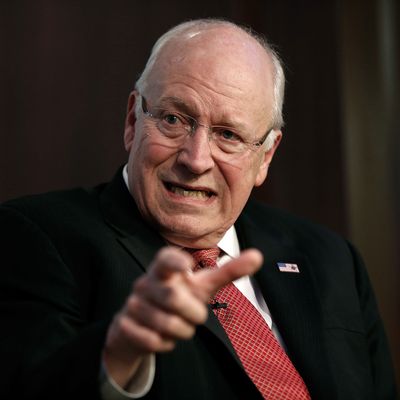
Every so often Dick Cheney will appear in public to vocalize his latest irritable mental gesture. Today he appeared with right-wing radio host Hugh Hewitt to assert the following: “I vacillate between the various theories I’ve heard, but you know, if you had somebody as president who wanted to take America down, who wanted to fundamentally weaken our position in the world and reduce our capacity to influence events, turn our back on our allies and encourage our adversaries, it would look exactly like what Barack Obama’s doing.”
Cheney’s regular utterances tend to meld together into an undifferentiated belligerent growl, but in this case he is (inadvertently) telling us something useful. The former vice-president is endorsing, or at least half-endorsing, the right-wing belief that to dismiss Barack Obama as a naif and a failure is far too kind. No, Obama is carrying out a secret plan to undermine American power. Versions of this theory have been fleshed out by such figures as Rush Limbaugh, Rudy Giuliani, and Dinesh D’Souza. They hold that Obama, driven by well-hidden black rage, seeks to humiliate the country that has oppressed African-Americans. This line of thought, while too deranged for Republican leaders to publicly endorse, has a great deal of influence among conservatives. Cheney’s comments serve as the latest illustration of the delusional paranoia running through even the very highest levels of the Republican Party.
Cheney’s logic also helpfully (and, again, inadvertently) illustrates the dilemma surrounding the current debate over Iran’s nuclear program. Like all Republican officeholders and some Democratic ones, Cheney thinks Obama has struck a weak deal with Iran. Unlike most of them, Cheney suspects Obama has done so not out of naïveté but out of a cunning plan to actually encourage the Iranian nuclear program.
But what if we apply Cheney’s analytic method to his own administration’s Iran policy? After all, it was under the Bush administration that the Iranian nuclear program flourished, bringing the regime from 164 to 8,000 centrifuges. Even so hawkish a figure as Lindsey Graham concedes that the previous administration utterly botched the task of preventing a nuclear Iran. (“I think the Bush administration, they were a miserable failure when it came to controlling Iran’s nuclear ambition,” Graham said.)
What’s more, the expansion of Iran’s power under Bush was not limited to the blossoming of its nuclear program. In 2003, an extremely hostile neighboring regime (that had launched a war against it two decades before) was deposed, creating a power vacuum that Iran filled. Cheney seems to have played a role there. A Cheney-style analysis of the Bush administration’s Iran policy would conclude that it was carrying out a deliberate plan to elevate Iran’s standing.
Such a conclusion would obviously be insane. But it happens to fit the facts far more tightly than the same conclusion about Obama’s Iran policy. And this, in turn, reminds us that the most plausible real-world alternative to Obama’s Iran deal is not some “better deal.” The alternative is either war or threatening war while refusing to negotiate.
It is true that the deal Obama struck is probably not going to leave the Middle East a terribly secure place. Iran will most likely test the international community’s willingness to uphold the letter of the agreement, and its willingness to reimpose sanctions if and when Iran violates its terms. History shows that containing the nuclear ambitions of a determined state is extremely hard. Obama’s approach implicitly acknowledges the limits of American leverage, trading away its maximal demand to end all Iranian nuclear work completely in return for pragmatic concessions (like the elimination of advanced centrifuges, and the establishment of a vigorous inspection regime) that at least offer a chance to contain Iran’s race to the bomb. The Bush approach claimed to deny Iran any right whatsoever to nuclear research, but its actual success at holding this line was less than nothing.
The Bush administration has been out of power long enough to allow Obama’s critics to conveniently forget how the conservative Iran strategy actually operates in practice; Cheney’s comments offer a timely reminder.






























